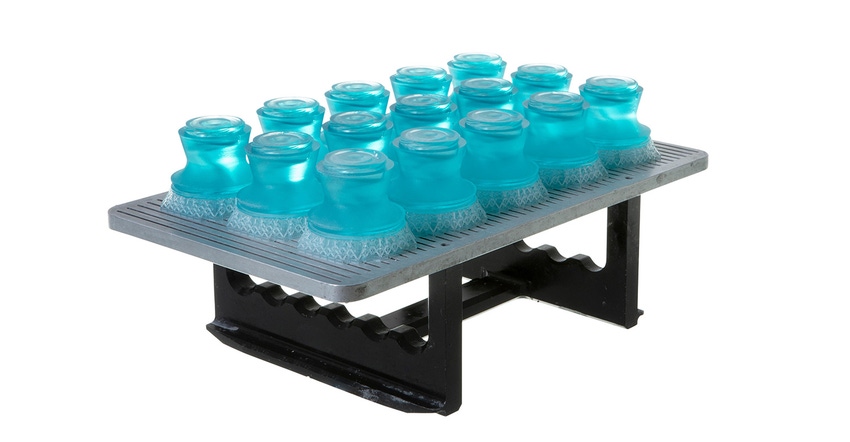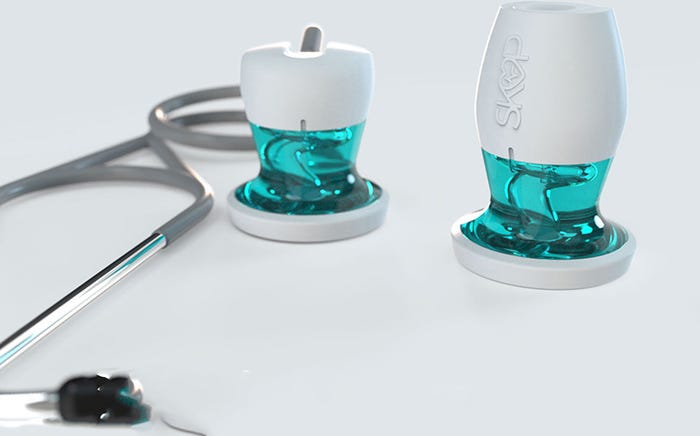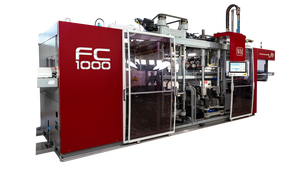Ultrafast polymer 3D printers from Nexa3D and performance-matched materials developed by Henkel are key to achieving annual production goals of 100,000 units.
September 9, 2021

The Chinese word for “crisis” is composed of two characters, one meaning “danger” while the second one signifies “opportunity.” One can feed off the other, in other words. That came to mind as I learned about the world’s first additively manufactured, connected stethoscope developed through a partnership between Nexa3D, a startup that makes ultrafast polymer 3D printers; global giant Henkel; and French medtech startup WeMed. The medical device OEM saw an opportunity in the rapid adoption of telemedicine and remote diagnostics as COVID-19 — the crisis — marched across the globe.
Produced on the NXE400 ultrafast 3D printer using performance-matched Henkel materials, the WeMed Skop is the world’s first connected stethoscope to be additively manufactured in its entirety at scale. Annual production volumes will exceed 100,000 units, according to Nexa3D, which will showcase Skop at RAPID + TCT 2021 at McCormick Place, Chicago, on Sept. 13 to 15.
Overcrowded hospitals and restrictions on in-person medical visits during the pandemic led US regulators to broaden access to telehealth. In turn, that increased acceptance of the technology by practitioners and patients alike. “Suddenly, the way patients receive and consume healthcare has been transformed for the better,” wrote Antoine Robiliard in sister media outlet MD+DI. He cited analyst firm IDC, which predicts that 65% of patients will have access to care through a digital front door into telehealth by 2023.
French startup WeMed was founded during the early days of the COVID-19 epidemic precisely to respond to accelerating demand for new diagnostic medical devices that support teleconsulting and remote monitoring. Nexa3D and Henkel came together with French contract manufacturer Third to help WeMed develop, manufacture, and launch its new product.
|
The design of the 3D-printed, connected Skop is based on biomimetic principles. |
Intended for remote auscultation, the Skop leverages biomimetic design principles to maximize auditory performance. Its geometry can only be achieved through additive manufacturing, according to WeMed.
“We developed the Skop in response to a global call for democratized, affordable teleconsulting healthcare solutions,” said Cyrille Lecorq, co-founder and CEO of WeMed. “From the get-go, it was obvious to us, that our biomimicry design could only be manufactured using 3D printing. Together with our additive manufacturing expert partner, Third, we selected Nexa3D’s ultrafast 3D printers with Henkel’s customized materials as the best production solution to meet our productivity, reproducibility, precision, and cost requirements, so that we can quickly and deliver hundreds of thousands of Skops to waiting customers around the world.”
According to Nexa3D, its printers were selected not just because they produce high-quality parts, but also because they work fast and provide an economic advantage. “Nexa3D’s 20x productivity advantage means our customers can manufacture products at unmatched speed,” said Chief Operating Officer Kevin McAlea.
The device has already been tested and embraced as a device of choice by cardiologists, pulmonologists, general practitioners, emergency physicians, and nurses, according to WeMed. The Skop is currently being marketed and annual production volumes are expected to exceed 100,000. With Nexa3D's NXE400 printer, contract manufacturer Third said it can achieve production volumes with a fleet of printers that is five times smaller than otherwise would be necessary, making its manufacturing more efficient and cost effective.
About the Author(s)
You May Also Like





